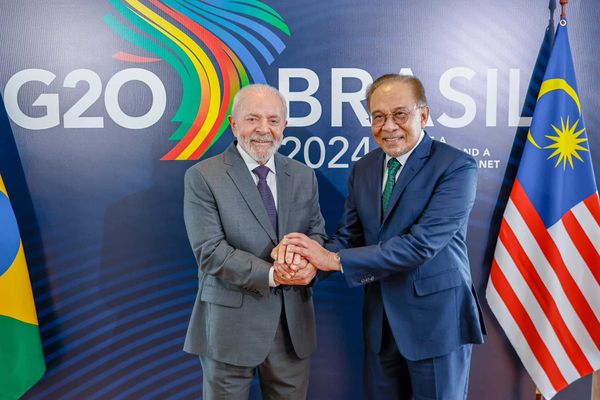RIO DE JANEIRO, Nov 18 — Malaysia and Brazil are keen to jointly explore initiatives during Malaysia’s Asean chairmanship next year, coinciding with Brazil’s BRICS presidency and its role as the host of the 30th United Nations Climate Change Conference.
In a joint statement issued after a bilateral meeting between President Luiz Inácio Lula da Silva and Prime Minister Datuk Seri Anwar Ibrahim on the sidelines of the G20 Summit, both leaders have pledged to work together for a revitalised multilateral system based on the principles of the United Nations Charter and international law.
They recognise the need for comprehensive reforms in global governance to make it more effective, transparent and accountable while taking into account the aspirations of emerging and developing countries to play a greater role in international affairs.
This would reflect the social, economic and political realities and predicaments of the 21st century, as well as the increasing prominence of the Global South.
At the same time, Anwar and Lua have also noted the emergence of new centres of power, policy decision-making, and economic growth, which should pave the way for a more equitable, just, democratic, and balanced multipolar world order.
Both leaders also supported bilateral and international efforts to promote a just and equitable energy transition that takes into consideration national circumstances in developing countries and their contributions to attaining the global objective of the Paris Agreement under the United Nations Framework Convention on Climate Change.
They also recognised the importance of biofuels in decarbonising the mobility and transport sector in developing countries, praised the progress in bilateral energy initiatives and agreed on maintaining ongoing dialogues on renewable energy cooperation.
Anwar and Lula also expressed their support for efforts to develop bilateral collaboration in the semiconductor sector through the increasing dialogue between governments, the private sector, and the research, development, and innovation institutions of both countries.
They reaffirmed the benefits of an exploratory, horizontal, and collaborative approach that aligns with the industrial policies of both countries.
Simultaneously, both leaders also noted the importance of bilateral trade and mutual investment flows as vectors of development in both countries and recognised the need to diversify and further expand the volume of commerce, leveraging the long-standing trade and investment ties between the two countries.
To this end, Anwar and Lula acknowledged that a bilateral investment agreement would enhance economic linkages between Brazil and Malaysia.
Additionally, they welcomed the opportunity for enhanced cooperation through the Asean-Brazil Sectoral Dialogue Partnership and expressed support for ongoing initiatives within the Asean-Brazil Practical Cooperation Areas.
— Bernama




